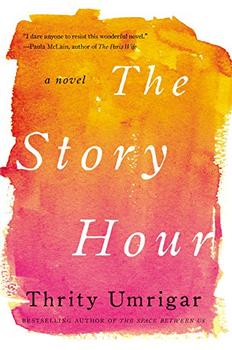Summary | Excerpt | Reading Guide | Reviews | Beyond the book | Read-Alikes | Genres & Themes | Author Bio

Thrity Umrigar's sixth novel is simultaneously a study of a friendship, a morality play, and an exploration of how personal history can shape relationships, often in surprising ways. But readers certainly won't anticipate this kind of scope from the novel's opening scenes, in which Lakshmi Patil, a recent immigrant to the U.S. from India, attempts to commit suicide and is assigned to a therapist, Maggie Bose. The Story Hour is the kind of novel that starts out small, but quickly expands to encompass much broader themes and conflicts than the reader might initially expect.
Lakshmi's suicide attempt is similar; initially, her despair seems out of proportion to the event that supposedly precipitates it (her favorite customer at her husband's Indian restaurant is moving out of state.) But over the course of the novel, both through Lakshmi's therapy sessions with Maggie and through her own narration of her story, we realize that this small disappointment is part of a much larger pattern of disappointment, loss, and betrayal - committed by herself as well as others.
At first, Lakshmi is resistant to therapy, especially with Maggie, who is African American. Although she doesn't love him, Lakshmi has internalized many of her husband's prejudices, and Maggie finds herself taking some rather unorthodox measures (such as strolling with Lakshmi around the grounds of the mental hospital and, later, inviting her to her home for pro bono therapy sessions) in order to break down Lakshmi's resistance. But Maggie is also resistant to Lakshmi's eventual overtures and declarations of friendship, even as she continually breaks down the customary boundaries between doctor and patient - first allowing Lakshmi to cook dinner for Maggie and her husband (who, much to Lakshmi's surprise and delight, is also Indian) and, later, giving her driving lessons and hiring her to cater a party.
Maggie sees commonalities between herself and her seemingly vulnerable patient - both women lost their mothers when they were young, both have imperfect marriages, both have problematic relationships with their fathers. But when Lakshmi reveals a secret, Maggie's perception of her completely changes, even though Maggie, herself, is keeping an equally damning secret.
In chapters equally balanced between Maggie's and Lakshmi's points of view, Umrigar explores the evolving nature of the relationship between these two similarly complicated women. Maggie's chapters are told primarily in third person from Maggie's perspective (with the exception of one awkward and largely unnecessary section narrated from the point of view of a minor character), while Lakshmi's are in first person, narrated in somewhat broken English that, while conveying insight and perception, may come across as offensive, or at least troublesome, for some readers ("I not knowing that when sun set over ocean, it look as if the whole world ending and being born at same time".) These narrative weaknesses aside, The Story Hour is, as the title suggests, a compelling testament to the power of story to unite people, transcend differences, and ultimately heal both the self and relationships.
![]() This review was originally published in The BookBrowse Review in September 2014, and has been updated for the
September 2015 edition.
Click here to go to this issue.
This review was originally published in The BookBrowse Review in September 2014, and has been updated for the
September 2015 edition.
Click here to go to this issue.

If you liked The Story Hour, try these:

by Jillian Cantor
Published 2016
A spellbinding historical novel about a woman who befriends Ethel and Julius Rosenberg, and is drawn into their world of intrigue, from the author of Margot.

by Jill Alexander Essbaum
Published 2015
A striking debut novel of marriage, fidelity, sex, and morality, featuring a fascinating heroine who struggles to live a life with meaning.
Your guide toexceptional books
BookBrowse seeks out and recommends the best in contemporary fiction and nonfiction—books that not only engage and entertain but also deepen our understanding of ourselves and the world around us.